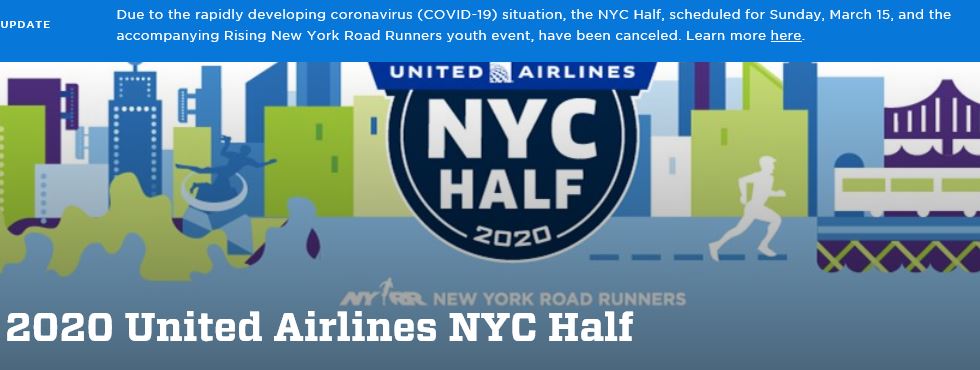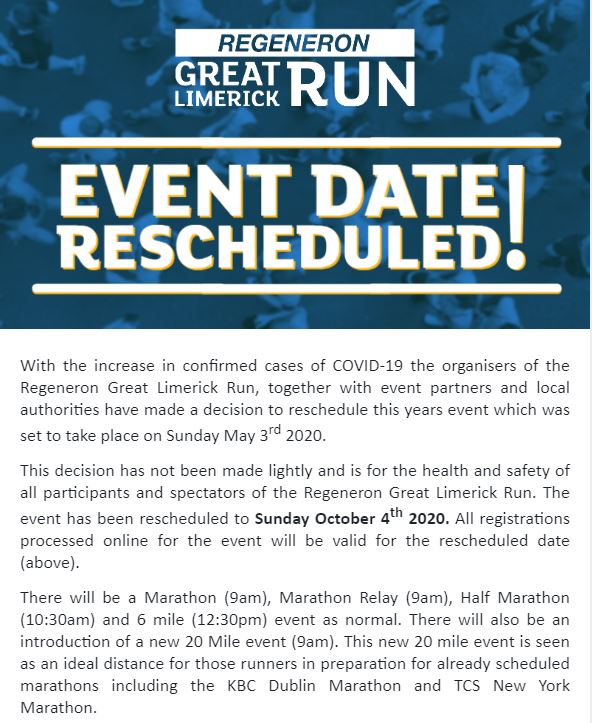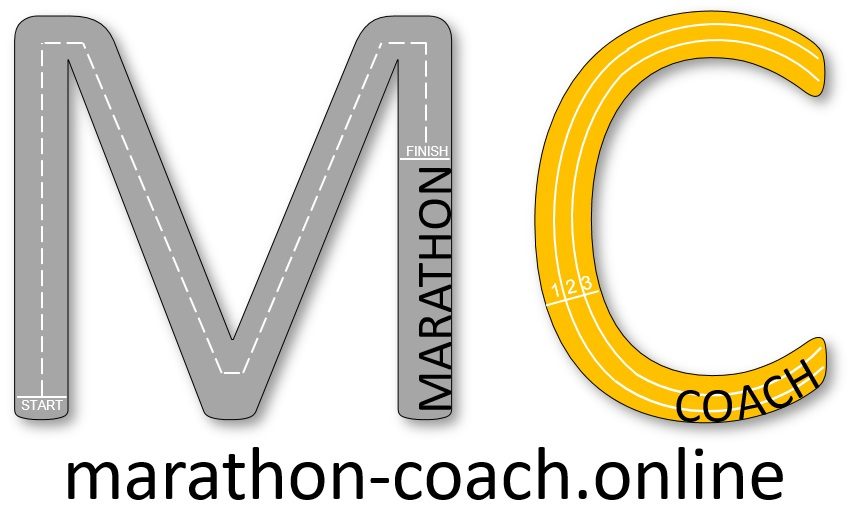Race is cancelled or you get an injury
You plan one or two main race this year. Unfortunately few weeks before, the race is cancelled or you get an injury.

In the next few months, so many races are cancelled, and few of them with thousands of runners. Just looking at the local races it is the same. The major races have already confirm they will be postponed:
– Paris Marathon (65,000 runners) : 05th of April 2020 -> 18th of October 2020
– New York Half Marathon : 15th of March 2020 => CANCELLED

– London Marathon : 26th of April 2020 -> Still planned today the 12th of March
– Milan Marathon : 05th of April 2020 – Postponed to a new date (date to be confirmed)
– Limerick Marathon : 03rd of May 2020 -> 4th of October 2020

All local races are sending cancellation messages, and it is certainly the same all over the world.
You have been training hard during many months. These Sunday mornings when you went running under the rain, the cold instead of staying home with the family. On the other hand, you plan a marathon like London that is still planned, but may still be cancelled in few weeks.
You get an injury that affected your training or you can even be still injured. You need to get the injury well fixed before thinking about competing.
What to do?
First, if you live in an area where the virus is spreading, then ensure you follow the recommendations from the health services.
Mind yourself, have healthy food. For example, prepare a healthy Immune boosting smoothie.
For example in Ireland, the HSE guidelines on 06th of March 2020 : (https://www.hse.ie/eng/)
Advice for attendees of mass gatherings
Consider the following advice on how to protect yourself from COVID-19 infection. Information for the public on COVID-19 is available at the HSE website and HPSC website.
– If you are unwell, do not attend a mass gathering event
– Review travel guidance from your own country’s Department of Foreign Affairs and the Irish Department of Foreign Affairs
– Measures to protect against the spread of COVID-19 at mass gathering events
wash your hands properly and regularly with soap and water or an alcohol-based hand rub
cover your mouth and nose with a tissue or your sleeve when you cough and sneeze
put used tissues into a bin and wash your hands or use alcohol-based hand rub
do not touch your eyes, nose or mouth if your hands are not clean
– Read available information and recommendations available on the mass gathering event’s website, social media pages prior to attending the event
– High risk groups – those considered to be at higher risk for COVID-19 include the following:
# People aged 65 years and older
# People with long-term medical conditions – for example, heart disease, lung disease, diabetes or liver disease
If you are in a high risk group, consider if attending the mass gathering is in your best interest. Discuss your concerns with your doctor.
– Keep your distance from people who are sick
– Read distributed leaflets and signage when attending mass gathering events
– Follow the instructions of organisers and health personnel while at the event
– Be mindful of alcohol and drug use, as these may limit your ability to follow advice of the organisers and emergency personnel
For this year, look at your objectives. You may change them in order to have a great season. Do you want to spend 3 months of hard training with many long runs for a race that may be cancelled?
It is a season when you can improve your speed. It can bring your running to the next level.
Injury or niggle:
You have a serious injury, then after the inflammation, visit your physio and work on your rehabilitation. Instead of shorting your rehabilitation, to start back the training plan, then it is your chance to do the full rehabilitation. One of the main cause of injury is a previous injury that was not fully solved. It is then your chance to be healthy during many seasons.
If you have a recurring niggle, visit your physio. So many of us are running with dodgy knee, a tight hamstring, a slight Achilles inflammation, etc… You may have few days on inflammation then you will be able for the full rehabilitation.
I really think, now that you have this “free” time, you should completely mind your body.
Modify your objectives:
Instead of two marathons this year what about planning a marathon in autumn and then work on a very long training plan. We are always short on time, recovery after the first marathon is short, then we go to few weeks of speed training and we are already training the next marathon. We always squeeze the training sessions.
Having a long plan, we can now go to basics. We can divide the plan in different phases:
1/ BASIC training (to bring the fitness base with an increase in the mileage)
2/ SPEED training and STRENGTH training (work on your base speed, keeping a low weekly mileage but high intensity to increase you VO2 max, strength)
3/ 5km / 10km training with few races during the summer
4/ Few weeks to recover from the 5km / 10 km races
5/ MARATHON Training
With this long plan, your fitness will be optimized, contact me and we can discuss about a long time plan to improve your running to the next level.
improve your strength:
Improving your strength will be a great advantage on your running speed and help to avoid injuries. Including 2 sessions of Strength and Conditioning will have a real impact on your performances.
Conclusion
Your race is cancelled or you get an injury can be a good thing in order to bring your running to the next level.
